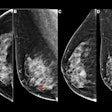The Public Health Agency of Canada (PHAC) has released a new report recommending ways to modernize preventive healthcare in the country by reforming how guidelines such as those related to breast and lung cancer screening are developed.
The External Expert Review (EER) of the Canadian Task Force on Preventive Health Care (CTFPHC) recommends reforms to make sure that preventive health guidance in Canada is more equitable, expert-informed, and responsive to real-world care. The resulting report is titled, Modernizing Preventive Health Care Guideline Development in Canada: A Way Forward.
“This report is not the end of the conversation; it is the beginning of an important transformation,” said Vivek Goel, chair of the EER Panel in the report. “I urge policymakers, healthcare leaders, and the public to embrace these ideas and work together in a coordinated approach to build a stronger, context-sensitive, and responsive approach to preventive health services and guideline development in Canada.”
Serving as an independent body, the CTFPHC develops evidence-based guidelines to support primary care providers in healthcare delivery. The task force in 2024 faced criticism from breast imaging societies for recommending informed decision-making and not regular screening for women ages 40 to 49. The updated recommendations also do not call for supplemental imaging in women with dense breasts or women with a personal family history of breast cancer.
Among the recommendations from the report are the following:
Formally including clinical subject matter experts in the task force’s working groups.
Structuring engagement of patients and community members, including those from underrepresented groups, to bring real-world lived experience into national guideline development.
Having equity-focused topic selection and public accountability to make sure preventive guidance addresses all patient populations in Canada.
Developing contextualizable and coordinated guidelines so that provinces and territories can implement evidence-based recommendations to fit their own systems and structures.
Implementing a phased transition to living guidelines, so recommendations keep up with ongoing science and practice developments.
PHAC will begin working with experts and stakeholders on reviewing and implementing these recommendations, according to a statement by Marjorie Michel, Minister of Health.
“I have asked PHAC that the modernized Task Force be fully operational by April 2026,” Michel said.
Dense Breasts Canada and Breast Cancer Canada are lauding the report and its recommendations.
“These systematic changes will save lives,” said Kimberly Carson, CEO of Breast Cancer Canada, in a prepared statement. “We commend … Michel for making this a priority so early in her mandate, and we thank former Health Minister Mark Holland for working so closely with Breast Cancer Canada during his tenure. This milestone reflects years of dedicated advocacy. Bringing expert voices into task force decision-making is a long-overdue step toward ensuring that both science and lived experience shape public policy for Canadians.”
"The need for a modern, responsive, accountable, transparent, inclusive, and expert task force has been clearly underlined in the report, and the recommendations put forward go a long way to address our longstanding concerns with the task force and its guidelines," Dense Breasts Canada stated. "We are optimistic that the proposed recommendations will be implemented, translating into better health outcomes for all Canadians."
Paula Gordon, MD, medical advisor to Dense Breasts Canada, said she is pleased to see this planned restructuring to address flaws in the task force's recommendations.
"The recommendations to incorporate modern evidence and include experts and patients in the guidelines discussion are long overdue," Gordon said to AuntMinnie.com. "We welcome the promised greater transparency and monitoring of outcomes that should be included in future guidelines."
The full report can be read here.




















